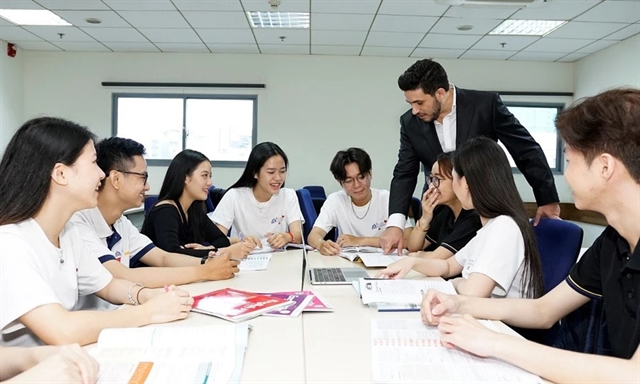 Society
Society


|
| A foreign lecturer works with students as Việt Nam’s universities seek to attract international expertise and boost teaching quality. — Photo baochinhphu.vn |
HÀ NỘI — A pilot policy under consideration by the National Assembly would exempt foreign experts and scientists from visa and work permit requirements for up to five years — a move that could reshape how universities and research institutions recruit and retain international talent.
Under the draft resolution, those eligible would include foreign professionals with doctoral degrees who come to Việt Nam to manage, teach, conduct research or engage in academic exchange. For many universities, this is the kind of 'game-changer' they have been waiting for.
Cutting through red tape
At the University of Engineering and Technology, part of Vietnam National University, Hà Nội, Rector Professor Chử Đức Trình said the proposed exemption is a long-overdue breakthrough.
He said that attracting international talent was not merely about improving the education system, but also about driving innovation and showing that the country was ready to compete in the global knowledge economy.
For years, bureaucratic red tape made it difficult for universities to sign contracts with foreign lecturers.
“Before autonomy, even short-term teaching contracts could take months,” Trình told Giáo dục Việt Nam (Việt Nam Education) e-magazine.
“And our pay scales were simply not competitive enough to keep experts here.”
Since gaining greater independence, particularly in scientific research, his university has drawn more support from corporate partners. That funding has made it possible to invest more confidently in foreign recruitment.
Currently, the school employs just one long-term lecturer from South Korea, but the number is expected to grow as collaboration expands. The university is also working with Korea Electric Power Corporation (KEPCO) to build a dedicated complex for visiting experts to work alongside Vietnamese faculty and students, he said.
Nguyễn Thị Mỹ Linh, Deputy Head of Personnel at the University of International, Vietnam National University, HCM City, said that new regulations have simplified some aspects of work permit procedures.
“Decree 219/2025/NĐ-CP has made the process more efficient than previous rules by decentralising approval to local authorities,” she said. “But there are still some issues.”
Among them is a requirement that foreign workers obtain a health certificate from a licensed medical facility inside Việt Nam - meaning many must travel to the country, pay for flights and accommodation, but still cannot begin work until the paperwork is completed.
In addition, employers must first post a public job listing for Vietnamese applicants before they can hire a foreign worker, even for highly specialised roles.
Linh said this requirement doesn’t align with the government’s push for international collaboration in education.
“It’s a real barrier when we’re trying to attract top scientists who expect a straightforward process and professional treatment,” she said.

|
| Students at Liên Bảo Primary School in Phú Thọ Province, attend a foreign language class with a foreign teacher. — VNA/VNS Photo |
Competing for global talent
Despite the challenges, Linh believes the visa and work permit exemption will give Việt Nam a strong competitive edge.
“It’s a signal that Việt Nam welcomes talent and is ready to remove unnecessary obstacles,” she said.
The stability of a five-year waiver, she added, allows foreign academics to commit to long-term teaching and research projects, fostering deeper and more sustainable partnerships.
At her university, international faculty currently account for 3.8 per cent of full-time staff, concentrated in key disciplines such as logistics, construction, electronics, and international business. The goal is to grow that figure significantly, she said.
At the Banking University of HCM City, Rector Associate Professor Nguyễn Đức Trung believes Việt Nam must go further — rethinking how it defines work itself in a digital age.
“Why shouldn’t a foreign professor who teaches full-time online for a Vietnamese university be recognised as a core faculty member?” he said.
“Remote management can be even more transparent and effective than short-term visiting contracts.”
Trung argues that Việt Nam’s labour regulations should reflect globalised, digital realities, recognising contribution and results over physical presence.
“This would also save significant costs for travel and housing, small obstacles that often derail recruitment,” he said.
He pointed out that online teaching allows lessons to be recorded, reviewed and shared widely, helping spread expertise far beyond the classroom.
For Professor Trình, policy reform is only part of the equation. Universities must also prepare their own capacity to make such reforms meaningful.
He said that foreign experts should be assigned genuine leadership roles rather than symbolic positions, adding that they needed to mentor local teams, guide research efforts, and contribute to the institution’s growth from within. He warned that if these experts worked in isolation, the initiative would not succeed.
“That requires universities to upgrade their working environments, from laboratories to academic freedom, and to help Vietnamese staff improve their language, technical, and cultural skills,” he said.
He also urged the State to continue expanding university autonomy so that schools can offer competitive compensation and flexible staffing models.
For her part, Linh sees the government’s proposed waiver as both an opportunity and a challenge for Vietnamese universities to meet international standards.
“Visa and work permit exemptions remove external barriers,” she said. “But internal strength will decide success.”
That means investing in modern laboratories, research funding, and policies that encourage academic freedom as well as offering globally competitive salaries, bonuses, housing and family support packages.
“We must build institutions where the world’s best researchers want to come - not just because it’s easier to get a visa, but because it’s a place where great work happens,” she said. — VNS




